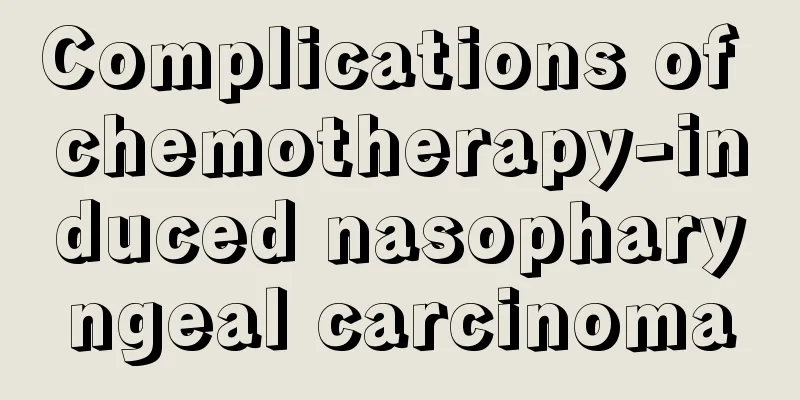Complications of chemotherapy-induced nasopharyngeal carcinoma

|
Nasopharyngeal carcinoma accounts for a large proportion of head tumors and is a highly malignant tumor. Patients who know about nasopharyngeal carcinoma should know that with the development of radiotherapy technology, early nasopharyngeal carcinoma can achieve good results. However, every treatment method has complications, and radiotherapy is no exception. Radiotherapy is the most common treatment for nasopharyngeal carcinoma patients, but what are the complications of radiotherapy for nasopharyngeal carcinoma? Many people are not very clear. Radiotherapy complications include radiotherapy regression: mainly temporomandibular joint dysfunction and soft tissue atrophy and fibrosis, radiation-induced dental caries and radiation-induced osteomyelitis of the jaw bone and radiation-induced encephalomyelopathy. There is currently no proper way to reverse it, but symptomatic treatment and supportive methods are helpful to a certain extent. Excessive irradiation of important tissues and organs must be strictly avoided. In addition, the systemic reactions of nasopharyngeal carcinoma radiotherapy include fatigue, dizziness, decreased appetite, nausea, vomiting, tastelessness or change in taste in the mouth, insomnia or drowsiness, etc. Some patients may experience changes in blood count, especially leukopenia. Although the degree varies, it can generally be overcome through symptomatic treatment and radiotherapy can be completed. If necessary, vitamin B1, B6, C, metoclopramide, etc. can be taken. If the white blood cell count drops below 3×109, radiotherapy should be suspended. Local reaction to radiotherapy for nasopharyngeal carcinoma: A small number of patients may experience parotid swelling after 2gy of parotid irradiation, which gradually subsides in 2 to 3 days. When irradiated for 40gy, saliva secretion is significantly reduced, while oral mucosal secretion increases, and the mucosa becomes congested and swollen. Patients have dry mouth and difficulty eating dry food. Therefore, excessive irradiation of the parotid gland should be avoided. Reactions of the skin, mucosa, and salivary glands may also occur. Skin reactions manifest as dry dermatitis or even wet dermatitis, and anti-inflammatory ointments with 0.1% borneol talc or lanolin as the base can be used topically. Mucosal reactions manifest as congestion, edema, exudation, and accumulation of secretions in the nasopharyngeal and oropharyngeal mucosa, and gargles and lubricating anti-inflammatory agents can be used topically. The complications of nasopharyngeal carcinoma radiotherapy are mainly those introduced above. Of course, the radiotherapy technology itself is constantly improving to address these adverse reactions. The current three-dimensional conformal intensity modulated radiotherapy has accurate positioning. The damage to normal tissue is small, so the side effects are much smaller. Experts from the hospital's tumor diagnosis and treatment center remind you: nasopharyngeal carcinoma radiotherapy has high requirements for equipment and doctors, and it is recommended to choose a large hospital for treatment. The above content introduces the complications of radiotherapy for nasopharyngeal carcinoma. We hope that the above content can be helpful to patients with nasopharyngeal carcinoma. Experts suggest that early detection and early treatment are necessary for any disease, which is the basis for maintaining health. |
<<: What are the dangers of nasopharyngeal cancer
>>: What are the complications of late-stage nasopharyngeal carcinoma?
Recommend
What are the symptoms of foot rot and how to classify it
There are also different types of foot rot. The c...
There is a hard bump on the head like a bone protrusion
There is a hard lump on the head like a bone prot...
Dry, red and flaky skin
Ultraviolet rays are very strong in the summer, s...
What is skeletal muscle rate
Everything in our human body has a certain ratio,...
Why is refractory lymphoma difficult to treat
Lymphoma is a systemic disease that is widely dis...
Symptoms of esophageal cancer
Symptoms of Esophageal Cancer: Esophageal cancer,...
What are the symptoms of skin cancer? Pay attention to these situations
Papules and erythema are common symptoms of skin ...
What is the cure rate for late-stage ovarian tumors?
When ovarian tumors occur, many women actively se...
Principle of Vaginal Tightening by Acupuncture
Many women suffer from vaginal relaxation due to ...
How to remove moles without leaving scars
Moles on the body or face are indeed ugly and aff...
What foods can prevent cervical cancer? What foods are good to eat to prevent cervical cancer?
Cervical cancer is generally difficult to treat, ...
What is the reason for ear swelling and stuffiness
Having problems with your ears is a very uncomfor...
One eye is swollen after sleeping?
In life, I believe many people have had this expe...
What are the items and costs of small cell lung cancer examination?
What are the examination items and costs for smal...
How to remove scale from glass
Glass is a material that is often used in our dai...









